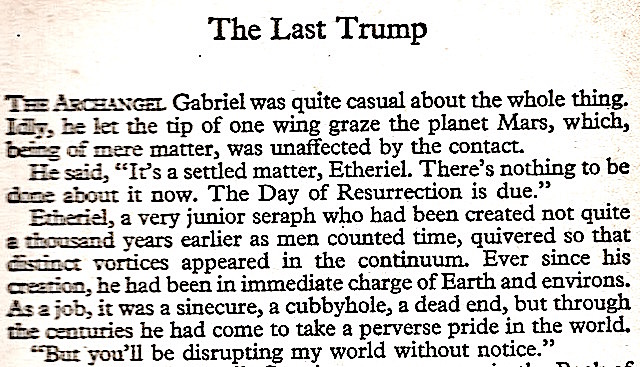Search
Recent comments
- 100.....
1 hour 47 min ago - epibatidine....
7 hours 38 min ago - cryptohubs...
8 hours 36 min ago - jackboots....
8 hours 44 min ago - horrid....
8 hours 52 min ago - nothing....
11 hours 16 min ago - daily tally....
12 hours 38 min ago - new tariffs....
14 hours 29 min ago - crummy....
1 day 8 hours ago - RC into A....
1 day 10 hours ago
Democracy Links
Member's Off-site Blogs
the prophecy of trump by asimov: the end that is not the end...

In his book Earth is Room Enough, Asimov indulges in the to be or not to be concept... In this story, The Last Trump, Things are not like they seem to be...
"... we're all dead aren't we? The world's come to an end, hasn't it?"
"But you've been declared legally dead and I haven't."
"Oh, we'll change that, son. There are going to be more of us than of you and votes count."
By the end, we are made aware that time is thus immaterial because the date of The Last Trump is wrong or not...
It was 7 a.m. on January 1, 1957, when R. E. Mann awoke with a start. The very beginnings of a melodious note that ought to have filled all the universe had sounded and yet had not sounded.
For a moment, he cocked his head as though to allow understanding to flow in, and then a trifle of rage crossed his face to vanish again. It was but another battle.
He sat down at his desk to compose the next plan of action. People already spoke of calendar reform and it would have to be stimulated. A new era must begin with December 2, 1944, and someday a new year 1957 would come; 1957 of the Atomic Era, acknowledged as such by all the world.
A strange light shone on his head as thoughts passed through his more than-than-human mind and the shadow of Ahriman on the wall seemed to have small horns on either temple.
© 1955 by King-Size Publications, Inc.
- By Gus Leonisky at 6 Sep 2020 - 6:29am
- Gus Leonisky's blog
- Login or register to post comments
the last judgement...
Trump — the last trumpet and the investigation of the possibility of Resurrection...
All funny and spooky at the same time...
Imagine a machine that views the past: we call this "history". When we invent the past (or the present) we call this "fiction". Here we have to realise that imagining the future isn't fiction but possibilities. Many of Asimov's views have turned out more possible than we'd like, including adultery with a robot.
Making some mistakes is not going to change the world or what we can do with it — but some mistakes will. This is The Watery Place story. A stupid mistake is made and things change.
It is my simpleton view that with Covid-19, a statistical mistake was possibly confounded with statistical error. Disease kill humans. We cannot escape this. We take hygienic precautions and have a battery of treatments that could work, yet smoking "still kills more than 7 million individuals per year"... Considering that half the human population of the planet smokes and that we are "ensmoked" by diesel fumes daily in our cities, it's a wonder than more people don't die from smoking. But here again our statistical analysis are wonky. Some people who die sooner may have died less sooner from smoking, but we'll never know. Or we know. Hospitals and the health system tell us that smoking is a major killer....
But in regard to statistics, I have explained simplistically why the South African Covid deaths are so low compared to the more "advanced" Western societies. It's simple maths really. The average life expectancy in South Africa is below 64. The average life expectancy in most western countries — except the USA (78.5) — is above 80. Most Covid-19 deaths in the world are from people over 65 with an average of around 80 years of age. Do the computation. Statistics can be deadly... And please consider that Covid-19 having killed "many older people", the average life expectancy will become lower...
Asimov would have given us some hints on where we went wrong...
And by the way, most of the "experts" who might have made THE mistake won't admit to it. They will fudge some vague concoctions with comparison of apples and oranges...
Addendum: While the Covid-19 statistical possibility is about 50 % sciences and 50 % politics, the statistics of global warming are 99 % scientifically accurate (satisfying at least 4 of the five scientific confirmation criteria), despite the RT and OffGuardian boffins arguing against it nearly daily. Global warming (aka climate change going in the wrong direction) models are accurate enough to bracket the lesser and higher possibility of damage within a few points, far better than hurricane or cyclonic centre-pathways prediction.
Global warming is real and anthropogenic.